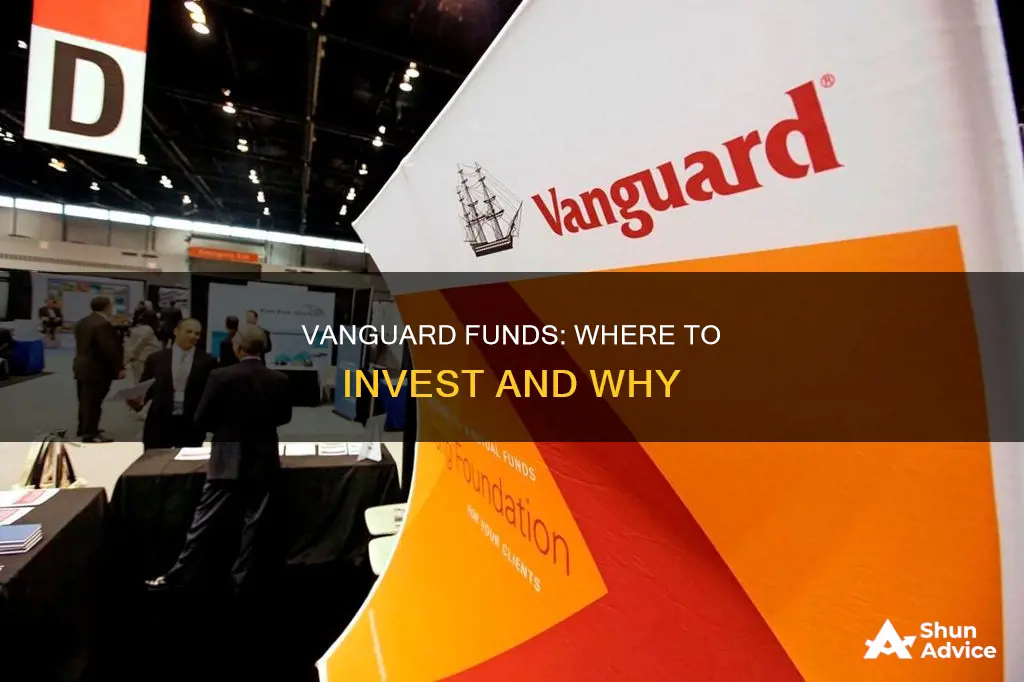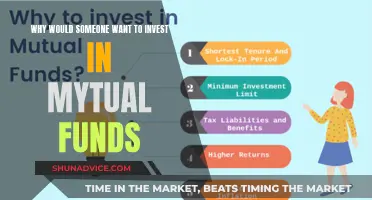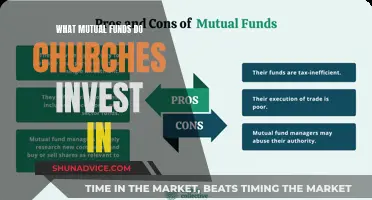
Vanguard funds are a popular choice for investors, offering a range of benefits such as low fees, instant diversification, and strong historical performance. With over $7 trillion in assets, Vanguard is one of the world's leading asset managers, providing simple and cost-effective investment options to the public. Vanguard funds cover a wide range of investment strategies, including index funds, actively managed funds, and target retirement funds, allowing investors to choose funds that align with their financial goals and risk tolerance. Vanguard's index funds, which aim to match the performance of a specific market index, are particularly popular due to their low costs and long-term profitability. Additionally, Vanguard offers a range of mutual funds and exchange-traded funds (ETFs) that provide exposure to various asset classes, sectors, and geographies. When deciding where to invest in Vanguard funds, investors should consider their financial goals, risk tolerance, and the specific features of each fund, such as expense ratios and historical performance.
What You'll Learn

Vanguard's simple, low-cost funds
Vanguard is known for its simple, low-cost funds. The company has built its reputation as a low-cost asset manager, and it remains one of the industry's lower-cost providers. Vanguard's average expense ratio across its index mutual funds and ETFs is 72% lower than the industry average.
Vanguard's simple investment strategy is reflected in its index funds, which are uncomplicated in their approach and reliable in their performance. The company's index funds are designed to follow a market benchmark, such as the S&P 500 or Dow Jones Industrial Average. This passive investing strategy allows investors to meet market moves rather than beat them for long-term gains.
- Vanguard 500 Index Fund Admiral Shares (VFIAX): This fund offers exposure to 500 of the largest U.S. companies, which make up 75% of the U.S. stock market's total value. It has a low expense ratio of 0.04%.
- Vanguard Total Stock Market Index Fund Admiral Shares (VTSAX): This fund provides investors with exposure to the entire U.S. stock market, including small-, mid-, and large-cap growth and value stocks. It has a low turnover rate of 2.2% and an expense ratio of 0.04%.
- Vanguard Total International Stock Index Fund Admiral Shares (VTIAX): This fund offers exposure to international stocks, excluding any companies headquartered in the United States. It tracks more than 8,600 stocks and has a turnover rate of 3.9% and an expense ratio of 0.12%.
- Vanguard Total Bond Market Index Fund Admiral Shares (VBTLX): This fund offers diversified exposure to the bond market, investing in more than 11,000 investment-grade bonds. It has an expense ratio of 0.05%.
- Vanguard Wellington Fund Investor Shares (VWELX): This fund is Vanguard's oldest mutual fund, offering a blend of about two-thirds stocks and one-third bonds. It has an expense ratio of 0.26% and a 30-day SEC yield of 2.3%.
Mutual Fund Investors: Declare Investments in Your ITR
You may want to see also

Vanguard's index funds vs. active funds
When deciding where to invest in Vanguard funds, it is important to understand the difference between Vanguard's index funds and active funds.
Index funds are considered to be passively managed. The manager of an index fund attempts to replicate the returns of the index it follows by purchasing all or almost all of the holdings in the index. On the other hand, the portfolio manager of an actively managed fund tries to beat the market by selecting specific investments. They perform an in-depth analysis of many investments to try and outperform the market index, such as the S&P 500.
Vanguard, the world's leading originator of index mutual funds, has a long history of strong performance. The company's index funds are particularly appealing for long-term investors due to their low costs. The average ongoing management expense of an actively managed fund is 1% more than that of a passively managed fund. This expense is one reason why actively managed funds tend to underperform their index-based counterparts.
Additionally, actively managed funds are less tax-efficient than index funds. Actively managed funds buy and sell investments more frequently, resulting in taxable capital gains for the fund shareholders if the fund is owned in a non-retirement account. In contrast, index funds, such as those offered by Vanguard, have lower turnover ratios, resulting in lower taxes.
When deciding between Vanguard's index funds and active funds, it is essential to consider your investment objectives, time horizon, and risk tolerance. While actively managed funds have the potential to outperform the market, they also come with higher fees and taxes. On the other hand, index funds offer instant diversification and tend to have lower costs and higher tax efficiency.
- Vanguard 500 Index Fund Admiral Shares (VFIAX)
- Vanguard Total Stock Market Index Fund Admiral Shares (VTSAX)
- Vanguard Growth Index Fund Admiral Shares (VIGAX)
- Vanguard Small-Cap Index Fund Admiral Shares (VSMAX)
- Vanguard Total Bond Market Index Fund Admiral Shares (VBTLX)
- Vanguard Balanced Index Fund Admiral Shares (VBIAX)
- Vanguard Total International Stock Index Fund Admiral Shares (VTIAX)
Savings Strategy: Mutual Funds Investment Allocation
You may want to see also

Vanguard's ESG funds
Vanguard offers seven ESG products: four exclusionary index funds and three actively managed funds.
The four exclusionary index funds avoid or reduce exposure to specific industries (such as firearms, tobacco, or fossil fuels) while seeking to achieve a market-like return.
The three active ESG funds seek to generate excess returns by allocating capital to companies that demonstrate leading ESG practices. Vanguard's actively managed funds include:
- VBPIX Baillie Gifford Global Positive Impact Stock Fund
- VEOIX Global Environmental Opportunities Stock Fund
- VEIGX Global ESG Select Stock Fund
IRA Investment Options: Mutual Funds or ETFs?
You may want to see also

Vanguard's retirement funds
Vanguard's Target Retirement Funds are a complete portfolio in a single fund. Each fund invests in Vanguard's broadest index funds, giving you access to thousands of U.S. and international stocks and bonds. The funds' managers gradually shift each fund's asset allocation from stocks to bonds, so the fund becomes more conservative as you near retirement.
- VSVNX Target Retirement 2070
- VTWNX Target Retirement 2020
- VTINX Vanguard Target Retirement Income Fund
- VFIFX Target Retirement 2050
- VFFVX Target Retirement 2055
- VTTSX Target Retirement 2060
Vanguard also offers a range of other retirement investment options, including IRAs (Individual Retirement Accounts), taxable accounts, mutual funds, ETFs (exchange-traded funds), and individual stocks, bonds, and CDs (certificates of deposit).
When choosing a retirement fund, it's important to consider your asset mix, which refers to the different types of assets you hold, such as stocks, bonds, and cash investments. The ideal asset mix depends on how far away you are from retirement. If you have a longer time horizon, you can focus more on growth and take on more risk. As you get closer to retirement, it's generally recommended to reduce your risk exposure and preserve your capital.
Mutual Fund Investment: Current Smart Choices
You may want to see also

Vanguard's international funds
International mutual funds are a great way to diversify a U.S.-focused portfolio and Vanguard offers a range of these funds to choose from. Vanguard's international funds give investors access to hundreds or even thousands of foreign securities, which spreads out risk more than owning just domestic stocks. Vanguard suggests that at least 20% of your portfolio should be invested in international stocks and bonds.
There are several ways to invest in foreign markets using Vanguard's international funds:
- International funds: These funds invest only in foreign markets, excluding the United States. For example, the Vanguard Total International Stock Index Fund Admiral Shares (VTIAX) provides access to more than 7,500 non-U.S. stocks.
- Global or world funds: These funds combine investments in foreign markets and the United States.
- Regional funds: These funds focus on a specific part of the world, such as Europe or the Pacific region.
- Developed markets funds: These funds invest in foreign countries with proven economies, such as Japan, France, and the United Kingdom.
- Emerging markets funds: These funds target "developing" economies, such as India, Brazil, and Taiwan.
Vanguard also offers investors the choice between index funds and actively managed funds. Index funds try to track the performance of a specific market benchmark, while actively managed funds are steered by Vanguard's expert portfolio managers who select specific securities for the fund. Actively managed funds give investors the opportunity to beat the market benchmark but also come with the risk of underperformance.
Smart Mutual Fund Investments: 16K Options
You may want to see also
Frequently asked questions
Vanguard funds are a collection of investors' money that fund managers use to invest in stocks, bonds, and other securities. They are known for their low costs and simplicity.
You should start by considering your savings goals and risk tolerance. This will help you determine how aggressive you want your investments to be and how long you want your money to be invested for. You should also research the fund's expense ratio and target asset allocation.
Some of the best Vanguard funds to invest in include:
- Vanguard Total Stock Market Index Fund Admiral Shares (VTSAX)
- Vanguard 500 Index Fund Admiral Shares (VFIAX)
- Vanguard Total International Stock Index Fund Admiral Shares (VTIAX)
- Vanguard Total Bond Market Index Fund Admiral Shares (VBTLX)
- Vanguard Wellington Fund Investor Shares (VWELX)







